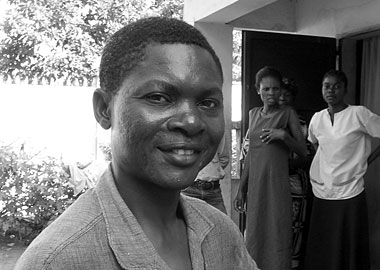An interview with Congo’s MB mission director Delphin Kapay
 Delphin Kapay is moderator of the Congolese MB Church (CEFMC) and head of the mission department for the conference. He teaches at Centre Universitaire de Missiologie, an interdenominational missions school in Kinshasa started by Nzash Lumeya. As a protégé of Lumeya, who currently teaches at MBBS in Fresno, Cal., Kapay is a visionary with many disciples, known for his intelligent and engaging preaching. In addition to his leadership of a local congregation, he travels widely, most recently to Kazakhstan in 2006 for the Global Mission Fellowship of Anabaptist-related churches.
Delphin Kapay is moderator of the Congolese MB Church (CEFMC) and head of the mission department for the conference. He teaches at Centre Universitaire de Missiologie, an interdenominational missions school in Kinshasa started by Nzash Lumeya. As a protégé of Lumeya, who currently teaches at MBBS in Fresno, Cal., Kapay is a visionary with many disciples, known for his intelligent and engaging preaching. In addition to his leadership of a local congregation, he travels widely, most recently to Kazakhstan in 2006 for the Global Mission Fellowship of Anabaptist-related churches.
Andrew Siebert, assistant editor of the MB Herald, interviewed Kapay about Congo’s role in global partnerships.
Since your visit to the Mennonite World Conference assembly in Zimbabwe 2003, you came back with a vision for Congolese missionaries reaching the world. Can you explain your motto: “the Lord is waiting for Congolese missionaries”?
In Congo we have people with vision, but don’t have the finances. I think that many other conferences around the world have money and vision, but not people.
I’m just looking how we can join together and reach people groups in the world. These are the things we are thinking about – how we can raise money in Congo for world evangelism?
Why is it easier for Congolese missionaries to reach various parts of the world?
In the Middle East and the “40/70 window” (focusing on all of Europe, the Caucasus, North and Central Asia, including Siberia and China), North Americans are often seen as colonialists or even spies. The people have wars to remind them why they shouldn’t collaborate with the West. But Africans don’t have this coloration. They’re like a question mark to many around the world. People don’t know why Africans are visiting their land. What do they really want? What message do they have? So African missionaries can use this situation, this leeway, as an opportunity to tell people about Jesus, his love for them, and his way to salvation. Also, Congolese people are known for their high level of cultural adaptation.
I want to organize a team for Arabic evangelism in Kinshasa based on what I saw in Kazakhstan. At the same time we are praying for the opportunity to plant an MB church in Kazakhstan.
How can North Americans get involved?
If North Americans want to help us, they can reinvigorate CEFMC’s financial potential in two ways. First, they can collaborate directly with CEFMC leaders who share the same vision for financial sustainability, or they could help with resources to help mentor leaders in particular churches. Secondly, to collaborate directly, you should first discuss how it will be helpful for CEFMC’s vision, and send a copy of the discussion to the mission office. The same can be done for overseas mission.
Though there have been some problems in the past, missionaries who use western resources now must send reports to the mission office, the executive committee, and finally the general assembly. This way there is a system for accountability in place with feedback to western sponsors.
You are currently preaching on the passage in Matthew 11:29–30 that says “take my yoke upon you and learn from me . . . for my yoke is easy and my burden is light.” What can North Americans learn about “taking on the yoke” of working with their Congolese brothers and sisters?
According to my message from Matthew, the first thing all of us need to understand is Jesus’ lordship in our lives and in the church. The Lord is calling us to work for him and not for ourselves, relatives, ethnic or business groups. We need to collaborate to reach the interests of the Lord and his church, and not those of our own. Nobody can say that he is Christian and refuse to work for him. And we cannot work for the Lord if we need to make more emphasis on our own interests first. Every time we encounter problems working together it is more because we are working for our own interests. Only the Lord’s interests can unite us, but our own can only divide us.
How does ICOMB play a role in this partnership?
ICOMB can help organize international missionary teams to reach the 10/40 and 40/70 world. Conferences can bring resources together and ICOMB will direct those resources to mission needs. ICOMB can also help deepen relationships between conferences or churches. For greater impact, ICOMB members can encourage mission agencies to coordinate their efforts in the same field.
Finally, what’s your favourite soccer team, and why?
My preferred soccer team is DC Motema Pembe. In Ado, my hometown, my parents used to say “this is a no-craft team.” But things have changed now, and many times this team is making an effort to play with “God power” (laughing).